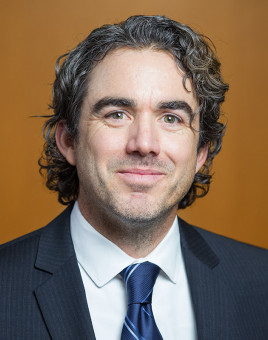
Keith Cunningham-Parmeter
Professor of Law
Biography
A scholar whose research has explored work-family policy, gender theory, and gig workers’ rights, Keith Cunningham-Parmeter focuses his writing on emerging theories of employment discrimination. Prior to joining the law faculty at Lewis & Clark, he represented migrant farmworkers as a Skadden Fellow with the Oregon Law Center. While there, Professor Cunningham-Parmeter was lead counsel in a wage and hour class action brought on behalf of food processing employees, which resulted in the largest judgment to date for agricultural workers in Oregon.
Professor Cunningham-Parmeter graduated from Stanford Law School with distinction and was elected to the Order of the Coif. He was the first-place winner of two writing competitions in law school and was selected as a Stanford Law School Public Interest Fellow. During law school, he worked at the East Palo Alto Community Law Project and the U.S. Equal Employment Opportunity Commission, providing focused legal services to immigrant communities and low-wage workers.
Upon graduation, Professor Cunningham-Parmeter served for two years as law clerk to Chief Judge Ancer Haggerty of the U.S. District Court for the District of Oregon. Prior to law school, he worked as a high school teacher in the Mississippi Delta as a member of Teach for America.
Professor Cunningham-Parmeter received the Robert L. Misner Award for Excellence in Faculty Scholarship and the Jerry E. Hudson Award for Excellence in Teaching and Leadership. His publications have appeared in leading law journals and have been cited in the Yale Law Journal, the Stanford Law Review, the Harvard Law Review, and by Justice Ruth Bader Ginsburg.
Specialty Areas and Course Descriptions
Academic Credentials
- JD with Distinction, Stanford Law School, Order of the Coif
- BA, University of Oregon, magna cum laude
Bibliography
When Amazon Drivers Kill: Accidents, Agency Law, and the Contractor Economy, 65 WM. & MARY L. REV. (forthcoming 2024)
Discrimination by Algorithm: Employer Accountability for Biased Customer Reviews, 70 UCLA L. REV. 92 (2023)
The Sexual Harassment Loophole, 78 WASH. & LEE L. REV. 155 (2021)
Gig-Dependence: Finding the Real Independent Contractors of Platform Work, 39 N. ILL. U. L. REV. 379 (2019) (invited symposium)
From Amazon to Uber: Defining Employment in the Modern Economy, 96 B.U. L. REV. 1673 (2016)
Marriage Equality, Workplace Inequality: The Next Gay Rights Battle, 67 FLA. L. REV. 1099 (2015)
(Un)Equal Protection: Why Gender Equality Depends on Discrimination, 109 NW. U. L. REV. 1 (2014)
Men at Work, Fathers at Home: Uncovering the Masculine Face of Caregiver Discrimination, 24 COLUM. J. GENDER & L. 253 (2013)
Forced Federalism: States as Laboratories of Immigration Reform, 62 HASTINGS L.J. 1673 (2011)
Alien Language: Immigration Metaphors and the Jurisprudence of Otherness, 79 FORDHAM L. REV. 1545 (2011)
Review of ILLEGAL PEOPLE: HOW GLOBALIZATION CREATES MIGRATION AND CRIMINALIZES IMMIGRANTS, by David Bacon, 63 INDUS. & LAB. REL. REV. 357 (2010)
Redefining the Rights of Undocumented Workers, 58 AM. U. L. REV. 1361 (2009)
Fear of Discovery: Immigrant Workers and the Fifth Amendment, 41 CORNELL INT’L L.J. 27 (2008) (invited symposium)
A Poisoned Field: Farmworkers, Pesticide Exposure, and Tort Recovery in an Era of Regulatory Failure, 58 N.Y.U. REV. L. & SOC. CHANGE 431 (2004)
Dreaming of Effective Assistance: The Awakening of Cronic’s Call to Presume Prejudice from Representational Absence, 76 TEMPLE L. REV. 827 (2003)
Note, Father Time: Flexible Work Arrangements and the Law Firm’s Failure of the Family, 53 STAN. L. REV. 967 (2001)
Law School Faculty is located in Legal Research Center on the Law Campus.
MSC: 51
email lawfac@lclark.edu
voice 503-768-6601
fax 503-768-6671